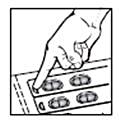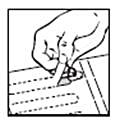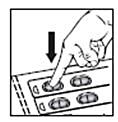20 mg, 80 mg hard capsules
cabozantinib
1. What COMETRIQ is and what it is used for
What COMETRIQ is
COMETRIQ is a cancer drug containing the active substance cabozantinib. It is a drug used to treat medullary thyroid cancer, an unusual thyroid cancer that cannot be removed with surgery or that has spread to other parts of the body.
How COMETRIQ works
COMETRIQ blocks the effect of proteins called receptor tyrosine kinases (RTKs), which are involved in the growth of cells and the development of new blood vessels that supply the cells. These proteins can be found in large amounts in cancer cells. By blocking their effect, COMETRIQ can slow the growth rate of the tumor and help cut off the blood supply that the cancer cells need. COMETRIQ can slow or stop the medullary thyroid cancer from growing. The drug can also help shrink tumors associated with this type of cancer.
2. What you need to know before taking COMETRIQ
Do not take COMETRIQ
- if you are allergic to cabozantinib or any of the other ingredients of this medicine (listed in section 6).
Warnings and cautions
Talk to your doctor or pharmacist before taking COMETRIQ if you:
- have high blood pressure
- have or have had an aneurysm (enlargement and weakening of a vessel wall) or a rupture in a vessel wall
- have diarrhea
- have recently coughed up blood or had major bleeding
- have had surgery in the last month (or if you have surgery planned), including dental surgery
- has received radiation treatment in the last 3 months
- have inflammation of the intestine (for example, Crohn’s disease, ulcerative colitis, or diverticulitis )
- have received information that your cancer has spread to the airways or esophagus
- recently had a blood clot in the leg, stroke, or heart attack
- taking medications to control your heart rhythm, have a slow heart rhythm, have heart problems or problems with your calcium, potassium, or magnesium levels
- have severe liver or kidney disease.
Talk to your doctor if any of these apply to you. You may need to be treated for it, or your doctor may change your dose of COMETRIQ or stop treatment altogether. See also section 4, “Possible side effects”.
Tell your dentist that you are taking COMETRIQ. It is important that you take care of proper oral hygiene when you are treated with COMETRIQ.
Children and young people
COMETRIQ is not recommended for children or adolescents. It is not known what effects COMETRIQ has on people under 18 years of age.
Other medicines and COMETRIQ
Tell your doctor or pharmacist if you are taking or have recently taken any other medicines, including medicines obtained without a prescription, herbal medicines, or other herbal medicines. This is because COMETRIQ may affect the way some other medicines work or change their effects. In addition, some other medicines may affect the way COMETRIQ works. This may require your doctor to change the dose (s) you are taking.
- Medicines for fungal infections, such as itraconazole, ketoconazole, and posaconazole
- Medications used to treat bacterial infections ( antibiotics ) such as erythromycin, clarithromycin, and rifampicin
- Allergy medications such as fexofenadine
- Medicines for angina pectoris (chest pain due to insufficient blood flow to the heart), e.g. ranolazine
- Steroids used to reduce inflammation or treat several different diseases of the immune system
- Medications used for epilepsy and seizures such as phenytoin, carbamazepine, and phenobarbital
- Herbal remedies that contain St. John’s wort (Hypericum perforatum), which are sometimes used to treat depression or depression-like conditions such as. anxiety
- Medications used to thin the blood, e.g. warfarin and dabigatran etexilate
- Medications used to treat high blood pressure or other heart conditions, e.g. aliskiren, ambrisentan, digoxin, talinolol, and tolvaptan
- Medications used to treat diabetes, e.g. saxagliptin and sitagliptin
- Medications used to treat gout, e.g. kolkicin
- Medicines for HIV or AIDS , e.g. ritonavir, maravirok and emtricitabine
- Medicines for viral infections, e.g. efavirenz
- Medications used to prevent graft rejection (cyclosporine) and cyclosporine-based treatments for rheumatoid arthritis and psoriasis
Oral contraceptives (taken by mouth, swallowed)
If you take COMETRIQ while taking oral contraceptives, these contraceptives may be ineffective. You should therefore also use a barrier method (eg condoms or diapers ) while you are taking COMETRIQ and for at least 4 months after stopping treatment.
COMETRIQ with food
Avoid eating anything that contains grapefruit while using this medicine, as it may increase the levels of COMETRIQ in your blood.
Pregnancy, breastfeeding, and fertility
Avoid getting pregnant while taking COMETRIQ. If you or your partner may become pregnant, use appropriate contraception during treatment and for at least 4 months after stopping treatment. Ask your doctor about which contraceptive methods are appropriate when taking COMETRIQ. See section 2.
Tell your doctor if you or your partner become pregnant or are planning to become pregnant while you are being treated with COMETRIQ.
Talk to your doctor BEFORE you take COMETRIQ if you or your partner are considering or planning to have a baby after treatment. There is a risk that your fertility (possibility of becoming pregnant) will be affected by treatment with COMETRIQ.
Women taking COMETRIQ should not breast-feed during treatment and not until at least 4 months after stopping treatment, as cabozantinib and/or its metabolites may be excreted in human milk and may be harmful to your baby.
Driving and using machines
Be careful when driving or using machines. Keep in mind that COMETRIQ can make you feel tired and weak.
How to take COMETRIQ
Always take this medicine exactly as your doctor or pharmacist has told you. Ask your doctor or pharmacist if you are unsure.
You should continue to take this medicine until your doctor decides to stop treatment. If you experience serious side effects, your doctor may decide to change the dose or discontinue treatment earlier than planned. Your doctor will decide if your dose needs to be changed, especially during the first eight weeks of treatment with COMETRIQ.
COMETRIQ should be taken once a day. Depending on the dose your doctor has given you, you should take as many capsules as possible:
- 140 mg (1 orange 80 mg capsule and 3 gray 20 mg capsules)
- 100 mg (1 orange 80 mg capsule and 1 gray 20 mg capsule)
- 60 mg (3 gray 20 mg capsules)
Your doctor will decide which dose is right for you.
The capsules are in a blister card sorted according to the prescribed dose. Each blister card has enough capsules to last for seven days (one week). The capsules are also available as a 28-day pack containing enough capsules for 28 days, in 4 blister cards with enough capsules to last for seven days for each blister card.
Every day, take all the capsules in a row. Section 6 provides more information about the blister cards, including how many capsules to take and how many capsules there are in total in each blister card. Make a note of the date you took your first dose in the space next to the capsules to keep track of your dose. To remove the capsules from the blister card:
1. Press the tab.

2. Pull off the paper strip.

3. Push the capsule out through the foil.

COMETRIQ should not be taken with food. You should not eat anything at least 2 hours before taking COMETRIQ and at least 1 hour after taking the medicine. Swallow the capsules one at a time with water. Do not open them.
If you take more COMETRIQ than you should
If you have taken more COMETRIQ than you were prescribed, contact a doctor immediately or go to the hospital with the capsules and this leaflet.
If you forget to take COMETRIQ
- If it is still 12 hours or more until the next dose, take a dose you forgot as soon as you remember. Take the next dose at the usual time.
- If it is less than 12 hours until the next dose, do not take a dose you forgot. Take the next dose at the usual time.
4. Possible side effects
Like all medicines, this medicine can cause side effects, although not everybody gets them. If you experience side effects, your doctor may ask you to take a lower dose of COMETRIQ. Your doctor may also prescribe other medicines to help you control the side effects.
Contact your doctor immediately if you notice any of the following side effects- you may need urgent medical attention :
- Symptoms such as abdominal pain, nausea, vomiting, constipation, or fever. They can be signs of gastrointestinal perforation, a growing hole in the stomach or intestines that can be life-threatening.
- Swelling, pain in hands or feet, or difficulty breathing.
- A wound that does not heal.
- Vomiting or blood cough, which may be bright red or look like ground coffee.
- Pain in the mouth, teeth, and/or jaw, swelling or sores inside the mouth, numbness or feeling of heaviness in the jaw, or a loose tooth. These symptoms may indicate bone damage in the jaw ( osteonecrosis ).
- Seizures, headaches, confusion, or difficulty concentrating. These may be signs of a condition called posterior reversible encephalopathy syndrome (PRES). PRES is unusual (affects less than 1 in 100 people).
- Severe diarrhea that does not seem to go away.
Other side effects are:
Very common (may affect more than 1 user in 10)
- Stomach problems such as diarrhea, nausea, vomiting, constipation, indigestion, and stomach pain
- Difficulty swallowing
- Blisters, pain in hands or soles of the feet, rash or redness of the skin, dry skin
- Decreased appetite, weight loss, altered sense of taste
- Fatigue, weakness, headache, dizziness
- Changed hair color (lighter), hair loss
- Hypertension (high blood pressure )
- Redness, swelling or pain in the mouth or throat, difficulty speaking, hoarseness
- Changes in blood samples taken for a general health check and liver values, low electrolyte levels (eg magnesium, calcium, or potassium )
- Low levels of platelets
- Joint pain, muscle cramps
- Swollen lymph nodes
- Pain in arms, hands, legs, or feet
Common (may affect up to 1 in 10 people)
- Anxiety, depression, confusion
- General pain, chest or muscle pain, sore ears, ringing in the ears
- Weakness or decreased sensation or tingling in arms and legs
- Chills, tremors
- Dehydration/dehydration
- Inflammation of the abdomen or pancreas
- Inflammation of the lips and mouth pores
- Inflammation of the hair roots, pimples, blisters (on body parts other than the hands or feet)
- Swelling of the face and other parts of the body
- Loss of or altered taste
- Hypotension (decreased blood pressure )
- Atrial fibrillation (a fast and irregular heartbeat)
- Bleaching of the skin, flaky skin, unusually pale skin
- Abnormal hair growth
- Hemorrhoids
- Pneumonia
- Pain in the mouth, teeth, and/or jaw, swelling or sores inside the mouth, numbness or feeling of heaviness in the jaw, or a loose tooth
- Decreased thyroid activity, with symptoms such as fatigue, weight gain, constipation, the feeling of cold and dry skin
- Low levels of white blood cells
- Decreased level of phosphate in the blood
- Crack, hole or bleeding in the abdomen or intestines, inflammation or crack in the anus, bleeding in the lungs or trachea
- An abnormal connection in tissue one in the digestive system. Symptoms may include severe or persistent stomach pain
- Abnormal connections of tissue in the trachea, esophagus, or lungs
- An abscess (abscess with an accumulation of goods, with swelling and inflammation ) in the abdomen, around the groin, or in the teeth/gums
- Blood clots in blood vessels and lungs
- Stroke
- Fungal infection in e.g. the skin, mouth, or genitals
- Hard-to-heal wounds
- Protein or blood in the urine, gallstones, pain when urinating
- Dimsyn
- Increase in the amount of bilirubin in the blood (which can lead to jaundice / yellowish skin or eyes)
- The decrease in protein levels in the blood (albumin)
Uncommon (may affect up to 1 in 100 people)
- Inflammation of the esophagus. Symptoms may include heartburn, chest pain, nausea, taste change, bloating, belching, and indigestion.
- Infection and inflammation of the lungs, lung collapse
- Skin sores, cysts, red spots/spots on the face or thighs
- Facial pain
- Changes in test results that measure the blood’s coagulation capacity or blood cells
- Loss of coordination in the muscles, damage to the skeletal muscles
- Lack of attention, unconsciousness, speech changes, delirium, abnormal dreams
- Chest pain due to blockage of the arteries are, palpitations
- Liver damage, kidney failure
- Impaired hearing
- Inflammation of the eyes, cataract (cataract)
- Menstrual interruption, vaginal bleeding
- A condition called posterior reversible encephalopathy syndrome (PRES), with symptoms such as seizures, headaches, confusion, or difficulty concentrating
Has been reported (occurs in an unknown number of users)
- Myocardial infarction
- An enlargement and weakening of a vessel wall or a rupture in a vessel wall ( aneurysms and arterial dissections)
Reporting of side effects
If you get any side effects, talk to your doctor, pharmacist, or nurse. This includes any possible side effects not listed in this leaflet. You can also report side effects directly to the Medical Products Agency, www.lakemedelsverket.se. By reporting side effects, you can help increase drug safety information. Postal address
5. How to store COMETRIQ
Keep this medicine out of the sight and reach of children.
Do not use this medicine after the expiry date which is stated on the blister after EXP. The expiration date is the last day of the specified month.
Do not store above 25 ° C. Store in the original package in order to protect from moisture.
Medicines should not be disposed of via wastewater or household waste. Ask your pharmacist how to dispose of medicines no longer required. These measures will help to protect the environment.
6. Contents of the packaging and other information
Content declaration
The active substance is cabozantinib ( S ) -malate.
COMETRIQ 20 mg capsules contain kabozantinib ( S ) -malate equivalent to 20 mg kabozantinib.
COMETRIQ 80 mg capsules contain kabozantinib ( S ) -malate equivalent to 80 mg kabozantinib.
Other ingredients are:
- Capsule contents: microcrystalline cellulose, croscarmellose sodium, sodium starch glycolate, colloidal anhydrous silica, and stearic acid
- Capsule housing: gelatin and titanium dioxide (E171)
- The 20 mg capsules also contain black iron oxide (E172)
- The 80 mg capsules also contain red iron oxide (E172)
- Ink: shellac glaze, black iron oxide (E172), and propylene glycol
What the medicine looks like and the contents of the pack
COMETRIQ 20 mg hard capsules are gray with the text “XL184 20mg” printed on one side.
COMETRIQ 80 mg hard capsules are orange with the text “XL184 80mg” printed on one side.
COMETRIQ hard capsules are packaged in blister cards that are arranged according to the dose your doctor decides you need. Each blister contains a 7-day dose of the medicine. Each line in the blister map contains a daily dose.
The blister chart for 60 mg daily dose contains 21 capsules of 20 mg, which corresponds to a total of 7 daily doses. Each daily dose is in one row and contains 3 capsules of 20 mg:

The blister chart for the 100 mg daily dose contains 7 capsules of 80 mg and 7 capsules of 20 mg, which corresponds to a total of 7 daily doses. Each daily dose is in one row and contains 1 capsule of 80 mg and 1 capsule of 20 mg:

The blister card with 140 mg daily dose contains 7 capsules of 80 mg and 21 capsules of 20 mg, which corresponds to a total of 7 doses. Each daily dose is in one row and contains 1 capsule of 80 mg and 3 capsules of 20 mg:

COMETRIQ hard capsules are also available in 28-day packs:
84 capsules (4 blister cards with 21 x 20 mg) (60 mg daily dose )
56 capsules (4 blister cards with: 7 x 20 mg and 7 x 80 mg) (100 mg daily dose )
112 capsules (4 blister cards with: 21 x 20 mg and 7 x 80 mg) (140 mg daily dose )
Each 28-day pack contains enough medicine for 28 days.
Marketing Authorisation Holder
Marketing Authorisation Holder
Ipsen Pharma
65 quai Georges Gorse
92100 Boulogne-Billancourt
France
Manufacturer
Catalent UK Packaging Limited
Lancaster Way
Wingates Industrial Park
Westhoughton
Bolton
Lancashire
BL5 3XX
UK
Or
Catalent Germany Schorndorf GmbH
Steinbeisstr. 1 and 2
73614 Schorndorf
Germany
Contact the representative of the marketing authorization holder to find out more about this medicine:
Institute of Synthesis Products (IPSEN) AB
Kista Science Tower
Färögatan 33
SE- 164 51 Kista
Sverige / Ruotsi / Sverige
Phone / Puh / Tel / Phone: +46 8 451 60 00